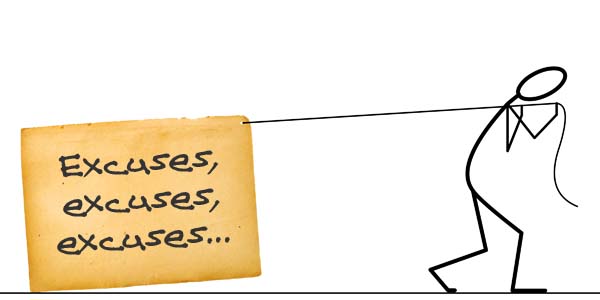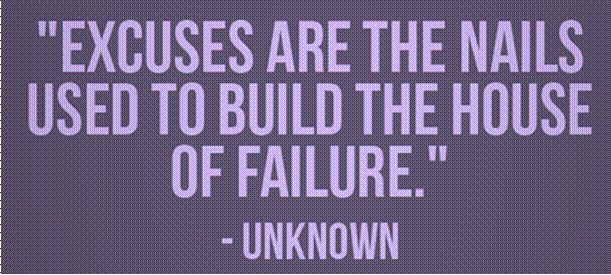
We all have excuses for many things in life. If we examine our excuses, we will find that we only use them for the things that aren’t working in our life. We never make excuses for what works, do we?
Excuses are stories we tell ourselves to justify things that didn’t go according to the expectations of others and even our own. We have excuses for why we didn’t succeed, why we forgot, why we couldn’t and even why we missed opportunities. The list is endless.
Usually, we bounce between blame and justifications to overcome disappointment. It’s important to understand that it’s not necessary to be hard on yourself whenever you come up with an excuse, and you should practice acceptance as another coping mechanism.
Excuses are essential for our survival. Without them, we wouldn’t be able to overcome failure, but if we use them too often, we do more damage than good to our emotional state.
Excuses are stories we tell ourselves to justify something we did or didn’t do, and they prevent us from moving forward and growing. Think about them as anchors. Every time I justify something that didn’t go well, I’ve thrown an anchor into the water and prevented myself from adapting and making progress.
After dropping that anchor, I need a lot more energy to move forward, and it slows me down.
Explaining vs. Excusing

Many people ask me at presentations, “Ronit, what’s the difference between explaining and making an excuse?”
Good question!
It’s simple.
There’s no difference!
We use the same words and phrases when we explain and when we make an excuse. Both of them are meant to give us a feeling that we have managed the “failure”. To determine if an explanation or excuse is good or not, we need to ask ourselves if it was empowering or disempowering.
Saying something that ends with “it was someone else’s fault”, “it wasn’t worth it”, “it was impossible” or “I give up” is disempowering. Say something that focuses on a better future or gives us an idea for doing things differently next time is empowering.
Here are some examples:
| Expression | Attitude | Outcome |
|---|---|---|
| “I failed my exam because my teacher sucks” | Blaming | Disempowering |
| “I failed my exam because I’m not very good in this subject” | Justifying | Disempowering |
| “I failed my exam. Next time, I will ask for help and study harder” | Taking responsibility | Empowering |
Better, future oriented phrases are similar to picking up the anchor of the ship and preparing for better sailing.

When you blame someone too much and when you are critical and judgmental, you corner them and turn on their “defense mechanism” of excessive use of excuses. And when you do it enough, you will force them to be good “excusers”.
This is especially important in parenting. When you are angry or disappointed with your kids, never ask them why they did the things you didn’t want them to do, because this gives them more excuse-making practice.
Why?
Because they will answer and practice using excuses and become better and better at it.
For example, if they were nasty to their sibling, don’t ask “Why did you hit your sister?” because their brain will find an excuse. Instead ask,” Tell me how can you be kinder to your sister?” because the brain will search for the answer for this as well and in this case, you want them to hear the answer.
It trains the body to search for solutions rather than justify the problems.

Excuses for the good things
While excuses for things we are unhappy with weight us down, excuses for good things can propel us forward faster. This is why to improve happiness, we advise people to write 3 good things that happened to them during the day and why they happened.
This type of explanation will make you happier and you will sail through life faster and more easily.
We all make excuses sometimes. It happens in those moments on our journey across the vast ocean of life when we need a break. It’s only natural to stop and have a break, but if you do it too often and for too long, don’t be surprised when if you don’t seem to be getting anywhere.
Measure the frequency of you anchor-dropping and focus on the time it takes you to pick up the anchor and move on. The faster, the better.
Happy sailing,
Ronit











